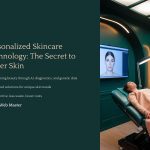 As beauty and wellness industries evolve, personalized skincare technology has emerged as a transformative force. The days of generic skincare routines are fading fast. With the integration of artificial intelligence, skin diagnostics, and genetic data, consumers now enjoy customized solutions that cater specifically to their unique skin needs. This innovative approach not only enhances effectiveness but also reduces waste, cuts costs, and boosts confidence. In a world increasingly shaped by data and self-optimization, tailored skincare is no longer a luxury—it’s becoming the new standard. The future promises even more exciting developments, from real-time biomonitoring to AI-powered formulation engines that adapt over time.
As beauty and wellness industries evolve, personalized skincare technology has emerged as a transformative force. The days of generic skincare routines are fading fast. With the integration of artificial intelligence, skin diagnostics, and genetic data, consumers now enjoy customized solutions that cater specifically to their unique skin needs. This innovative approach not only enhances effectiveness but also reduces waste, cuts costs, and boosts confidence. In a world increasingly shaped by data and self-optimization, tailored skincare is no longer a luxury—it’s becoming the new standard. The future promises even more exciting developments, from real-time biomonitoring to AI-powered formulation engines that adapt over time.

What Is Personalized Skincare Technology?
Personalized skincare technology refers to the use of advanced tools such as AI, machine learning, DNA testing, and skin sensors to design a skincare regimen specific to an individual’s unique characteristics. These systems analyze skin type, concerns, environment, lifestyle, and even genetic predispositions to determine the most effective ingredients and treatments. Instead of trial and error, users receive a scientifically-backed routine that evolves with them. This data-driven approach ensures that skincare is precise, targeted, and far more effective than traditional one-size-fits-all products.

How AI and Data Are Changing Skincare
Artificial intelligence now plays a pivotal role in revolutionizing skincare. Through facial recognition, real-time skin analysis, and pattern detection, AI tools can accurately detect skin conditions such as dryness, sensitivity, or acne before they become severe. Apps and devices powered by machine learning can recommend precise products based on climate, lifestyle habits, and usage history. This minimizes the guesswork and empowers users with confidence and clarity about their skin health. With every scan and update, the algorithms improve, becoming more intuitive and proactive in skincare suggestions.

Genetic Testing: Skincare Customized by Your DNA
DNA testing is now being used to fine-tune skincare like never before. By analyzing specific genes linked to collagen breakdown, pigmentation, and inflammation, companies can create hyper-customized products. This method helps in predicting how your skin might react to UV exposure or aging, and suggests preventative measures accordingly. Personalized recommendations based on genetic markers enhance long-term skin health by addressing issues before they manifest visibly. It’s a proactive way to maintain youthful, resilient skin using your body’s biological blueprint.

Skin Sensors and Wearables: The Next Frontier
Wearable skincare tech is gaining popularity as consumers seek more real-time insights into their skin’s condition. Smart patches and skin sensors can monitor hydration, pH levels, and even pollutant exposure throughout the day. This data syncs with mobile apps to give daily care tips and adjust routines dynamically. It marks a huge leap forward in responsive skincare, where your regimen adjusts based on what your skin actually needs in that moment. These innovations support smarter skincare routines that evolve with environmental and biological changes.

Eco-Friendly Benefits of Personalized Skincare
Tailored skincare isn’t just better for your face—it’s better for the planet. Custom formulations reduce product overuse and eliminate unnecessary packaging. Because they’re designed to work, fewer products are needed, cutting down on production emissions and waste. Brands are also shifting to refillable containers and biodegradable solutions, influenced by the efficiency and precision of personalized skincare. As sustainability becomes a non-negotiable consumer priority, tech-driven personalization is an ethical choice as much as a beauty enhancement.

The Future Outlook: What Comes Next?
In the near future, we can expect even more advanced integrations. Think AI-driven skincare that adapts to hormonal changes, mood sensors that influence formulations, and virtual dermatologists that provide 24/7 skin consultations. With advances in nanotech, ingredients will be delivered deeper and more efficiently. Blockchain technology may even track product authenticity and ingredient sourcing for ultimate transparency. These futuristic visions are already in development, indicating a booming sector full of potential for both users and innovators.
Conclusion: Personalized Skincare Is the New Normal
From AI and genetics to wearables and sustainability, personalized skincare is radically changing how we care for our skin. This technology not only optimizes results but empowers individuals with knowledge and tools tailored to their biology. As accessibility improves and prices drop, this will become the new normal for consumers globally. For brands, this is an opportunity to build stronger loyalty and meaningful innovation in an industry craving personalization and trust.
*Capturing unauthorized images is prohibited*


